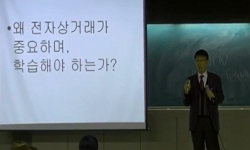우리 사회에서 유언제도에 관한 관심과 활용은 2000년대 이후 지속적으로 높아지고 있다. 그런데 유언에 관한 민법 규정들(민법 제1066조 내지 제1070조)은 60여 년 동안 단 한 차례도 개정이 되...
http://chineseinput.net/에서 pinyin(병음)방식으로 중국어를 변환할 수 있습니다.
변환된 중국어를 복사하여 사용하시면 됩니다.
- 中文 을 입력하시려면 zhongwen을 입력하시고 space를누르시면됩니다.
- 北京 을 입력하시려면 beijing을 입력하시고 space를 누르시면 됩니다.

디지털시대와 유언제도 - 유언제도의 현대화에 관한 연구 - = Wills in the Digital Age: A Study on the Modernization of the Testamentary System
한글로보기부가정보
국문 초록 (Abstract)
그런데 코로나 바이러스로 인한 팬데믹 시기를 거치면서 과학기술은 더욱 비약적으로 발전하였다. 특히 비대면이 일상화되면서 의료, 금융, 교육 분야 등 사회 주요 영역에서 한 공간에 모이지 않고서도 필요한 업무를 진행할 수 있게 되었고 각 분야의 디지털화는 거스를 수 없는 시대의 흐름이 되었다. 유언제도 역시 예외가 아니다. 영미법계 국가를 중심으로 유언제도의 디지털화가 논의되고 전자유언제도에 관한 입법이 이루어지고 있다. 전자유언제도는 전통적인 유언과 동일한 법적 효력을 가지면서도 디지털 기술을 통해 유언을 작성하는 것을 핵심 내용으로 한다. 디지털 환경에 익숙한 세대가 증가하면서 전통적인 유언의 방식보다 전자적 접근 방식을 선호하는 경향이 뚜렷해지고 있다. 그렇다면 현대 사회의 모든 영역에서 진행되는 디지털화의 흐름을 유언제도에도 수용할 필요가 있다. 다만, 전자유언제도를 도입함에 있어서는 전자적 방법을 이용하여 유언의 작성을 한층 편리하게 한다는 목표를 제도 설계의 한 축으로 하면서도 유언자의 동일성과 유언의 진정성을 확실하게 담보할 수 있는 장치들이 강구되어야만 한다.
우리 사회에서 유언제도에 관한 관심과 활용은 2000년대 이후 지속적으로 높아지고 있다. 그런데 유언에 관한 민법 규정들(민법 제1066조 내지 제1070조)은 60여 년 동안 단 한 차례도 개정이 되지 않은 채 민법 제정 당시의 규정 그대로 머물러 있다. 유언방식의 개선에 관한 연구는 꾸준히 진행되어 왔으나 현대 과학기술을 유언제도에 도입하는 방안에 대해서는 국내에서 연구가 거의 진행되지 않았다.
그런데 코로나 바이러스로 인한 팬데믹 시기를 거치면서 과학기술은 더욱 비약적으로 발전하였다. 특히 비대면이 일상화되면서 의료, 금융, 교육 분야 등 사회 주요 영역에서 한 공간에 모이지 않고서도 필요한 업무를 진행할 수 있게 되었고 각 분야의 디지털화는 거스를 수 없는 시대의 흐름이 되었다. 유언제도 역시 예외가 아니다. 영미법계 국가를 중심으로 유언제도의 디지털화가 논의되고 전자유언제도에 관한 입법이 이루어지고 있다. 전자유언제도는 전통적인 유언과 동일한 법적 효력을 가지면서도 디지털 기술을 통해 유언을 작성하는 것을 핵심 내용으로 한다. 디지털 환경에 익숙한 세대가 증가하면서 전통적인 유언의 방식보다 전자적 접근 방식을 선호하는 경향이 뚜렷해지고 있다. 그렇다면 현대 사회의 모든 영역에서 진행되는 디지털화의 흐름을 유언제도에도 수용할 필요가 있다. 다만, 전자유언제도를 도입함에 있어서는 전자적 방법을 이용하여 유언의 작성을 한층 편리하게 한다는 목표를 제도 설계의 한 축으로 하면서도 유언자의 동일성과 유언의 진정성을 확실하게 담보할 수 있는 장치들이 강구되어야만 한다.
다국어 초록 (Multilingual Abstract)
Since the COVID-19 pandemic, remote interactions have become the norm. Many sectors, including healthcare, finance, and education, have embraced digitization, making in-person gatherings less essential. This digital transformation is an inevitable trend, and the testamentary system is no exception. Discussions on digitizing wills have gained traction, and several common law countries have already enacted legislation on electronic wills.
Under the Korean Civil Code, the legal status of electronic wills remains uncertain. Therefore, it would be desirable to establish a clear legal framework with specific requirements for electronic wills. The formal requirements for traditional paper wills serve as safeguards against forgery and other potential abuses. Electronic wills are equally vulnerable to undue influence, coercion, duress, and fraud. Consequently, the level of protection provided for electronic wills should be at least as stringent as that for paper wills.
Public interest in Korea's testamentary system has steadily increased since the 2000s. However, the provisions on wills in the Civil Code of Korea have remained unchanged for more than 60 years, persisting in their original form since the Korean Civil...
Public interest in Korea's testamentary system has steadily increased since the 2000s. However, the provisions on wills in the Civil Code of Korea have remained unchanged for more than 60 years, persisting in their original form since the Korean Civil Code's enactment. Furthermore, little research has been conducted in Korea on integrating modern digital technology into the testamentary system.
Since the COVID-19 pandemic, remote interactions have become the norm. Many sectors, including healthcare, finance, and education, have embraced digitization, making in-person gatherings less essential. This digital transformation is an inevitable trend, and the testamentary system is no exception. Discussions on digitizing wills have gained traction, and several common law countries have already enacted legislation on electronic wills.
Under the Korean Civil Code, the legal status of electronic wills remains uncertain. Therefore, it would be desirable to establish a clear legal framework with specific requirements for electronic wills. The formal requirements for traditional paper wills serve as safeguards against forgery and other potential abuses. Electronic wills are equally vulnerable to undue influence, coercion, duress, and fraud. Consequently, the level of protection provided for electronic wills should be at least as stringent as that for paper wills.
동일학술지(권/호) 다른 논문
-
채권압류와 채권양도에서의 상계 - 재산권으로서 채권의 대외적 효력범위와 상계의 기대권 -
- 한국민사법학회
- 김창규
- 2025
- KCI우수등재
-
- 한국민사법학회
- 이진기
- 2025
- KCI우수등재
-
사해행위 취소에 따른 원물반환의무가 확정된 이후 후행소송으로 가액배상을 구할 수 있는지 - 대법원 2024. 2. 15. 선고 2019다238640 판결의 선고를 계기로 -
- 한국민사법학회
- 배수호
- 2025
- KCI우수등재
-
배우자의 간병행위와 기여분 - 대법원 2019. 11. 21.자 2014스44, 45 전원합의체 결정 -
- 한국민사법학회
- 윤태영
- 2025
- KCI우수등재




 스콜라
스콜라






